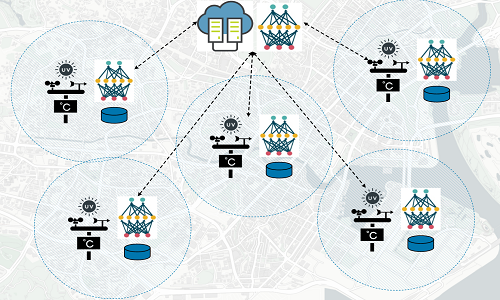Aim
The overarching aim is to deliver real-world application-driven research into real-time adaptive machine learning techniques, by developing the applicable theory, algorithms, architectures and applications. Theoretical foundations will drive the distributed online meta-learning algorithms that can run at the network edge. Potential solutions to specific real-world problems in fields like urban sensing, cyber-physical system (CPS) controlling and precision agriculture will also be explored.

Funder
This project is part of the Data-Centric Engineering Programme jointly led by the Lloyd’s Register Foundation and the Alan Turing Institute.
Main Contributors
Introduction
Adaptive real-time machine learning requires efficient reinforcement learning (how an algorithm should continuously interact with its environment to maximize its reward), online learning (dealing with continuous sequences of real-time data), and adaptive learning from a small sample size. This project aims at developing a series of real-time meta-learning algorithms that can be utilized to achieve continuous learning, predicting and controlling when functioning in a changing environment. The algorithm should function in a wide range of real-world applications, such as urban sensing, industry, and precision agriculture.
Primary Research
Efficient Reinforcement Learning
Unlike supervised or unsupervised learning based on large amounts of unified and stationary datasets, reinforcement learning focuses on how an agent should continuously interact with its environment to maximize its reward. Under such a setting, massive trials are generally necessary before or during the learning process, and success still highly depends on manually crafted learning architectures and targets. This project aims at solving the sample inefficiency problem in existing approaches..
On-line Learning
‘Off-line’ machine learning approaches typically learn from well-organized and stationary large-scale datasets through batch processing. In stream-oriented, sensor-based systems that are continuously delivering data, this would be unrealistic and inappropriate for many real-world infrastructure applications. Ideally, the learning of targeted hidden knowledge should be incremental, leveraging multi-source data streams. This project aims at developing online algorithms for continuous learning with guarantees of success.
Small-sample-size adaptive learning
Existing machine learning approaches generally train their models with massive amounts of data collected in stationary environments. However, such approaches are not applicable to the ever-changing environments typically found when sensor/actuator systems are deployed to make an infrastructure smart (e.g. smart cities, autonomous vehicles etc.). It’s unfeasible to re-collect and re-organize the data and re-train the previously learnt models whenever the environment changes. This project aims at developing high level ‘meta-learning’ algorithms that can rapidly notice environmental changes based on a limited amount of sensing data samples, and continuously
adjust the rest of the learning model accordingly.
